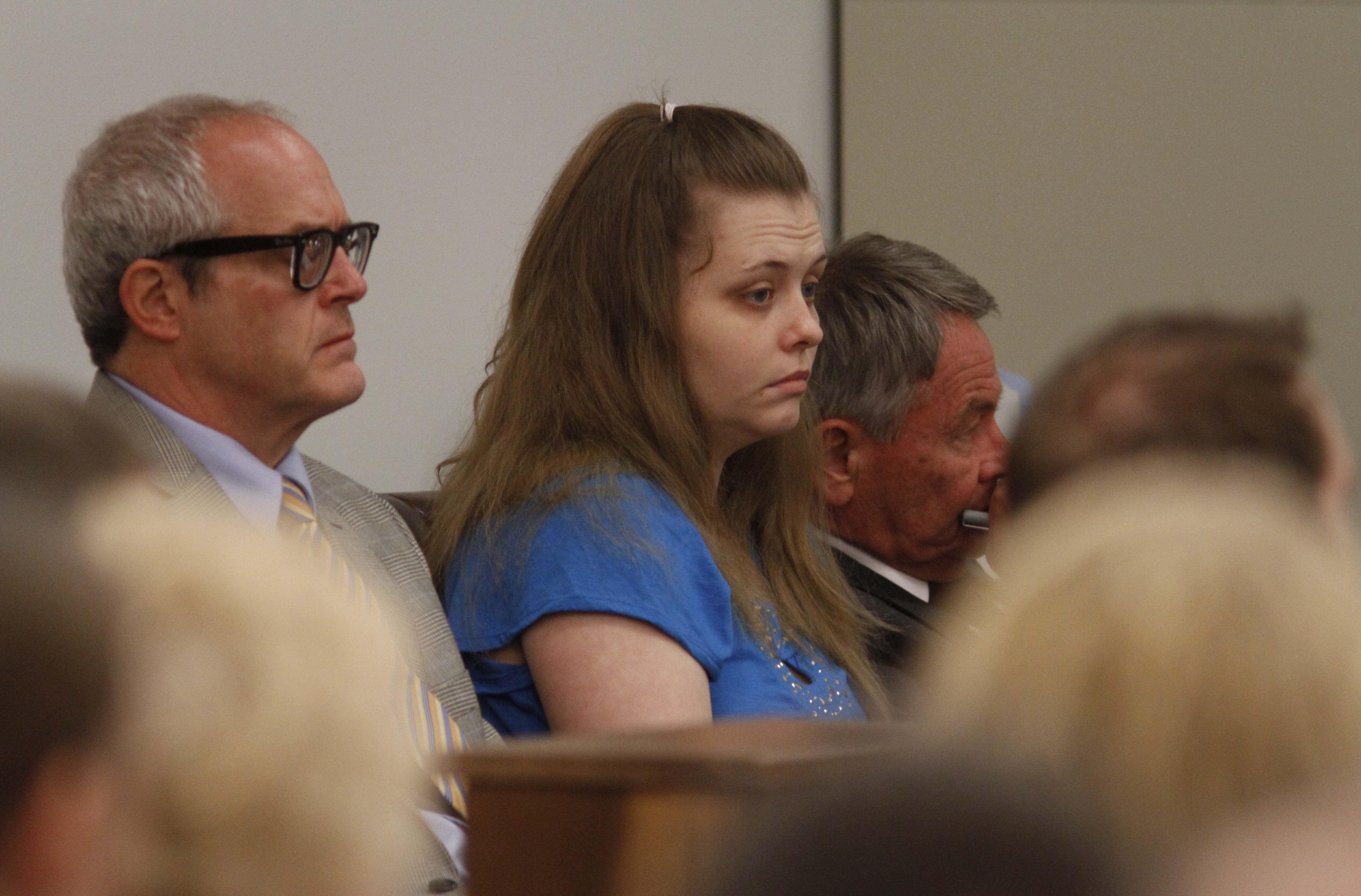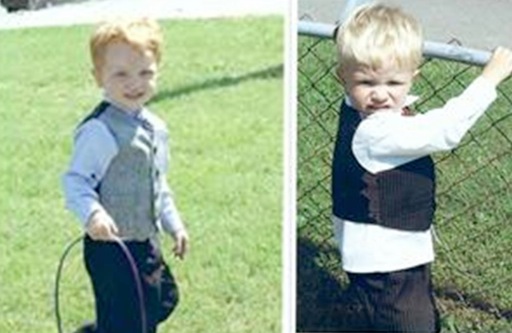 Public defender Richard Hughes, left, and defendant Tasha Bates listen to Judge Amy Reedy during jury selection in Bradley County Criminal Court in Cleveland, Tenn., on Tuesday. Tasha Bates, a 27-year-old mother is on trial in last summer's hyperthermia deaths of her two sons, 3-year-old River and 5-year-old Leland. Bates is charged with felony murder, aggravated child abuse and a meth-related charge.
Public defender Richard Hughes, left, and defendant Tasha Bates listen to Judge Amy Reedy during jury selection in Bradley County Criminal Court in Cleveland, Tenn., on Tuesday. Tasha Bates, a 27-year-old mother is on trial in last summer's hyperthermia deaths of her two sons, 3-year-old River and 5-year-old Leland. Bates is charged with felony murder, aggravated child abuse and a meth-related charge.VIDEO
This story is featured in today's TimesFreePress newscast.
ALSO READLife and MethTIMELINEJune 28, 2012 -- Shortly before 3 p.m., Tasha Bates called 911 saying she had found the boys unresponsive at her Keith Valley Road home. Initially, she told first responders the boys might have drowned. Bates later tells officials she had left her boys unattended on a Slip 'n Slide outside her home for 45 minutes. The high that day was 101, according to National Weather Service records.Authorities soon reported that the deaths didn't involve water, and Bates later told officials she had left the boys unattended on a Slip 'N Slide for 45 minutes.River is pronounced dead at Skyridge Medical Center in Cleveland.June 29 -- Leland is pronounced dead at T.C. Thompson Children's Hospital at Erlanger in Chattanooga.July 18 -- Tasha Bates is arrested after being indicted by a grand jury for felony murder, aggravated child abuse and meth charges. The Bradley County Sheriff's Office detectives say they've found reason to believe her sons died in a car. She is given no bond.July 20 -- A 911 tape of Tasha Bates' father, Mike Kile, calling for help is released. In the tape, Bates says that the boys were playing outside when they overheated.August 13 -- At her arraignment, Tasha Bates' mother says the boys were Tasha's "whole life." "She has been a mother since before she was 18. She would never do anything to hurt them," she said.Oct. 24 -- A final autopsy of the Bates' brothers reveals that River suffered core body temperatures of at least 109 degrees before his death. Officials said they believed the core temperature for Leland could have been just as high. The Bradley County medical examiner says the boys had the worst case of hyperthermia he had ever encountered. Both boys were hydrated and otherwise in good health.Nov. 19 -- Trial date set for Aug. 27.
If there is one thing the attorneys in an ongoing Bradley County, Tenn., murder case agree on, it's that June 28, 2012, was a hot day.
"Blistering hot," one attorney described. So hot it hit the record books.
So hot it could have quickly baked the inside of Tasha Bates' blue Toyota Corolla to 129 degrees or higher as her two sons drifted out of consciousness in the front and back passenger seats.
The attorneys aren't at odds about the fact that the brutal heat seeped the life out of Bates' young boys Leland, 5, and River, 3.
But they've taken sharply different positions on whether Bates, now 27, was responsible for leaving them vulnerable to its danger. Bates, who has been in jail without bond for a year, is facing felony murder, aggravated child abuse and meth charges in her sons' deaths
During opening statements in Bates' trial Tuesday, prosecutor Stephen Hatchett said the red flags -- like the fact that Bates changed her stories about that day, and that she had methamphetamine in her system -- were damning.
"You will find the boys did die in that car," Hatchett said in his opening statement. "Died of hyperthermia. Died of neglect that was brought on by meth."
Bates' appointed attorney, Richard Hughes, acknowledged the evidence would show irresponsibility and poor, panic-based decisions -- but not murder, and not the level of child neglect she is accused of.
"She loved her children. She did everything she could at that point to save their lives. ... The tragedy is it was too late," he said.
During jury selection, Hughes cautioned potential jurors to keep an open mind about Bates' circumstances as a recently divorced mother with no income.
"This case is not about how you would raise your children," he said. "Your obligation as a juror is to decide the case based on the facts that are presented."
A majority-male jury was seated after a game of musical chairs in which Hatchett and Hughes asked potential jurors if they could be fair despite the sensitivities of a case that involved the deaths of young children. No issue, said Hughes, "is more "tragic or sad or shocking."
Several potential jurors said that element made them too prejudiced to serve, including one woman who tearfully said it would only take "one photo" of the boys for her to convict Bates.
The final 16-member jury -- which includes two sets of alternates -- is made up of five women and 11 men.
They heard the state's first six witnesses, who included the medical responders who tried to save River and Leland, and a Tennessee Bureau of Investigation toxicology expert who said about 0.05 milligram of methamphetamine was found in Bates' system the day the boys died.
The agent couldn't pinpoint when or how Bates may have ingested the meth, or how it could have affected her that day.
Most questioning focused on the lead investigator of the case, Bradley County Sheriff's Detective Dewayne Scoggins.
Scoggins said Bates changed her story several times to explain where she found the boys unconscious: First it was in the yard, 25 minutes after she left them alone; then later inside her car, 45 minutes to an hour since she had left them to play outside alone.
Days after the deaths, Scoggins led a test to see how hot Bates' car could get in the afternoon sun. It was cooler on the test day than the 101-degrees of June 28, but the car's interior still reached 129 degrees.
While questioning Scoggins, Hatchett flipped through a slideshow of photos of the Bates' trailer and the garage where mother and sons slept that summer. The photos showed bags and piles of trash, which Scoggins testified contained meth-making material and drug paraphernalia, along with personal documents of Bates' linking her to the materials. Further, he said, she was associated with known meth-makers in the county.
But Hughes picked through Scoggins' testimony, arguing that many personal artifacts belonging to other people also had been found in the trash. There was no clear way to date the materials, trace where they had originated, or connect them directly to Bates.
He also pointed out that the meth-related items were not found until at least two weeks after the boys had died when detectives searched the property a second time.
Finally, he asked Scoggins if Bates seemed high or out of it the day the boys died. Scoggins said she did not.
The trial resumes today in Bradley County Criminal Court in front of Judge Amy Reedy.
Contact staff writer Kate Harrison at kharrison@timesfreepress.com or 423-757-6673.

